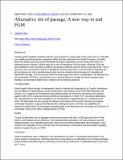Alternative Rite of Passage: A New Way to End FGM
View/
Publication Date
2018-07Type
Article, Journalviews
downloads
Metadata
Show full item recordCitation
Joachim Osur, 2. Alternative rite of passage: A new way to end FGM, Journal of Obstetrics and Gynaecology Canada, Volume 42, Issue 2, 2020, Pages e18-e19, ISSN 1701-2163, https://doi.org/10.1016/j.jogc.2019.11.029. (https://www.sciencedirect.com/science/article/pii/S1701216319310722) Abstract: Background Female genital mutilation (FGM) continues to be practiced in various parts of the world and is a culturally and socially sanctioned gender subjugation effort that also undermines the health of women. Currently about 200 million girls and women worldwide have been subjected to and are living with FGM. It is estimated that an average 3 million girls are at risk of undergoing FGM annually. Although FGM has been outlawed in many countries in Africa, the practice continues to thrive at the community level. This is because to the communities FGM has a significant meaning beyond the cut that involves integrating the girl and placing her into a predetermined social structure including discontinuation of schooling and early/child marriage. The circumcision itself has severe acute and chronic complications. We theorize that the continuation of FGM in communities is as a result of failure to manage the social change process leading to a discordance between law, medicine and community practices. The intervention Amref Health Africa through its headquarters based in Nairobi and supported by its Canada, Netherlands and US offices is implementing a social transformation intervention to end FGM with objectives that include: (1) To support the development and implementation of community owned laws and policies against FGM; (2)To change community beliefs and perceptions on FGM; (3) To provide an alternative rite of passage that is safe and acceptable to the community for integrating girls to a redefined social order. The intervention is done among the Maasai communities of Kenya and Tanzania and includes community education; using community decision making structures to enhance acceptability and ownership of alternative rite of passage; graduating girls in the alternative rite of passage; and inclusion of community voices in the policy making process on FGM. Results To date 30 alternative rites of passage ceremonies have been held with 14 000 girls saved from FGM; further, 1200 Maasai warriors (Morans), 400 traditional birth attendants, 500 cultural leaders and 250 religious leaders have publically denounced FGM and are promoting alternative rites of passage. There has been less opposition to the FGM law from the intervention communities with local leaders adopting bylaws to support the ban on FGM. Conclusion FGM is practiced to mark a milestone in the development of a girl in communities that practice it but carries adverse consequences. Working with these communities on an alternative rite of passage alleviates social conflict in transitioning the community to end FGM by 2030 and is a sustainable way to secure the girls’ future.
Abstract/
Background Female genital mutilation (FGM) continues to be practiced in various parts of the world and is a culturally and socially sanctioned gender subjugation effort that also undermines the health of women. Currently about 200 million girls and women worldwide have been subjected to and are living with FGM. It is estimated that an average 3 million girls are at risk of undergoing FGM annually. Although FGM has been outlawed in many countries in Africa, the practice continues to thrive at the community level. This is because to the communities FGM has a significant meaning beyond the cut that involves integrating the girl and placing her into a predetermined social structure including discontinuation of schooling and early/child marriage. The circumcision itself has severe acute and chronic complications. We theorize that the continuation of FGM in communities is as a result of failure to manage the social change process leading to a discordance between law, medicine and community practices. The intervention Amref Health Africa through its headquarters based in Nairobi and supported by its Canada, Netherlands and US offices is implementing a social transformation intervention to end FGM with objectives that include: (1) To support the development and implementation of community owned laws and policies against FGM; (2)To change community beliefs and perceptions on FGM; (3) To provide an alternative rite of passage that is safe and acceptable to the community for integrating girls to a redefined social order. The intervention is done among the Maasai communities of Kenya and Tanzania and includes community education; using community decision making structures to enhance acceptability and ownership of alternative rite of passage; graduating girls in the alternative rite of passage; and inclusion of community voices in the policy making process on FGM. Results To date 30 alternative rites of passage ceremonies have been held with 14 000 girls saved from FGM; further, 1200 Maasai warriors (Morans), 400 traditional birth attendants, 500 cultural leaders and 250 religious leaders have publically denounced FGM and are promoting alternative rites of passage. There has been less opposition to the FGM law from the intervention communities with local leaders adopting bylaws to support the ban on FGM. Conclusion FGM is practiced to mark a milestone in the development of a girl in communities that practice it but carries adverse consequences. Working with these communities on an alternative rite of passage alleviates social conflict in transitioning the community to end FGM by 2030 and is a sustainable way to secure the girls’ future.
Further Details
Abstract only
Publisher
Elsevier Inc.ISSN
1701-2163Collections
- General - GEN [367]

